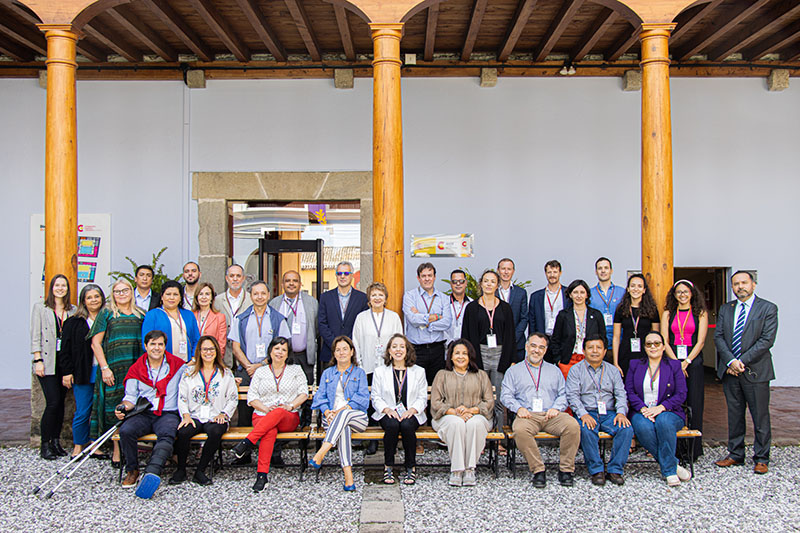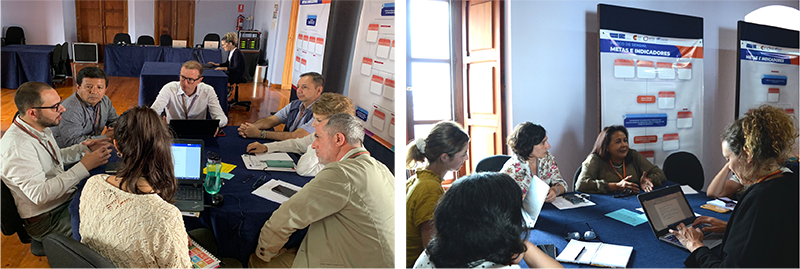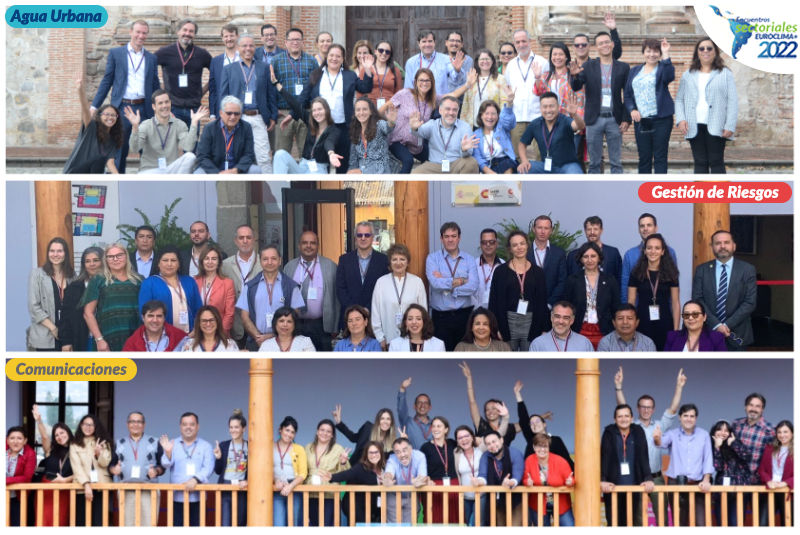More than 60 people took part in the meetings, exchanging experiences and knowledge, which allowed them to reflect on what has been achieved and to plan for the future.
21 October 2022. La Antigua, Guatemala. For the first time, technicians from the Disaster Risk Management and Urban Water projects met in person, in a series of sectoral meetings that also included various training sessions with communicators of these actions. The Training Centre of the Spanish Agency for International Development Cooperation (AECID) was the venue for these events, where technical experts shared their experiences, lessons learned and stories of their projects.
It is no coincidence that these two sectors, whose projects are implemented by AECID and the French Development Agency - AFD, shared the meeting, since, as mentioned by the participants during the events, the sectoral projects have several points in common: disaster risk management must include adequate water management in its planning, in order to mitigate vulnerability to any risk or disaster. In turn, achieving resilient drinking water services in cities also means being able to cope with risks, emergencies and disasters, such as floods and droughts.
This was also the first time that the communicators met to take stock of what has been done and what remains to be done. The activity allowed them to train, strengthen their skills in areas for improvement and learn about some successful actions that they can adapt to their own communities.
This is how these days were experienced:
Disaster risk reduction as a central pillar of sustainable development

With the participation of 17 representatives of seven multi-country projects from Argentina, Bolivia, Brazil, Cuba, Ecuador, El Salvador, Guatemala and Peru, the Sectoral Meeting on Disaster Risk Management was held in La Antigua, Guatemala. This space facilitated the exchange and sharing of lessons learned and best practices among the sector's projects.

The opening ceremony was attended by Noora Hayrinen, Head of the Political Section of the European Union (EU) in Guatemala, Jesús Molina, Director of the AECID Training Centre in Guatemala, Marco Varea, Head of EUROCLIMA at the AFD and Cristina Aldama, General Coordinator of Spanish Cooperation in Guatemala, who emphasised that "the work being done in direct contact with the communities must be valued, adapting risk prevention systems and actions to local knowledge, in order to achieve the sustainability of the projects".
During the meeting, the projects were able to identify their contributions to meeting the targets and indicators of the Sendai Framework, which represents the global roadmap for reducing the loss of human and economic life as a direct result of disasters (Guralnik, 2022, p.06). Within the discussion, the social component of disaster risk management was highlighted, as well as the importance of ensuring the mainstreaming of the gender approach in the implementation of initiatives.
The main challenges in this area were addressed, particularly the need to establish a dialogue between actors for multilevel and intersectoral coordination, including the public sector, as well as the private sector and civil society organisations.

Finally, during the closing ceremony of the meeting, Sergio Garrido, Head of Projects of the AECID in Costa Rica, mentioned that "This meeting has allowed us to understand that in EUROCLIMA+ we are an enormous amalgam of actors ranging from the local to the global. And that, as a sector, we are contributing from the local level to global goals such as those established by the Sendai Framework", and he emphasised that from now on "future opportunities are opening up, for which a document will be drawn up systematising all the lessons learned that we have collected, in the hope that they will be useful for other actors and projects working in the same field".

Communicating to transform

“Information without context does not build criteria": this phrase from José Kont, one of the instructors of the communicators' meeting classes, was one of the main conclusions of this event, which took place on 18 and 19 October, with the participation of more than 15 communicators from the Risk Management and Urban Water projects. It covered topics such as storytelling, social networks, communication and climate action, COP27 and relations with mass media, among others, to strengthen the capacities of communicators.
There was also a space entitled 'In the voice of the projects', in which the communicators of the projects "Pachayatiña/Pachayachay", "Building Resilience" and "Risks without Borders", of the Risk Management component, as well as "Water for Abancay", "Water Management in the AMSS", "Governance of Water and Territory in the RHVA" and "Urban Water in the Marqués Valley" of the Urban Water sector, shared experiences, lessons learned, outcomes and success stories in their communications.
The event was opened by Jesús Molina, Director of the AECID Training Centre in La Antigua; Alexandra Cortés, communications and visibility expert of the EUROCLIMA+ Secretariat; Marco Varea, EUROCLIMA+ Officer for AFD and Sergio de León, Press, Information and Cultural Affairs Officer of the Delegation of the European Union in Guatemala. Alexandra Cortés affirmed that: "The experts gathered in this communications meeting are fundamental for each one of their projects, and for sharing information and carrying out knowledge management".

For his part, Marco Varea said: "The communication of the Programme must induce citizens to have best practices to tackle climate change", a statement shared by Sergio de León, who concluded that the communication we implement must be strategic, taking into account our publics, the audiences, the messages we must include, but mainly the channels and the ways through which we communicate, in order to be clear and concise.
"It was a very interesting and participatory space, we took away many lessons learned, content that will be very useful to put into practice for the future," said Oscar Rodriguez, from the project Fostering Resilience in Central America, of the Risk Management sector.
On the other hand, Ana Isabel Mendoza, communicator of the "Urban Waters of the Marquense Valley" project in Guatemala, of the Agua Urbana sector, said that she took a lot of hope from this meeting, and that the most valuable thing was being able to learn from the experiences of the other projects, and to recognise each other as projects that are pursuing the same objective, in order to communicate more effectively with the same common goal.
From the experts: three tips from National Geographic photographer Sergio Izquierdo

- 'Get out of the box': to know what people want to know in order to communicate based on that.
- Connecting ourselves with people through our communications, using emotions and storytelling.
- Translating our initiatives from a technical language to a universal language, with resources such as photos and videos.
En voz de los expertos: claves de José Kont para fortalecer nuestras redes sociales
- Be clear about who our message is aimed at and what their interests are.
- Develop an ideal frequency, based on our target audience: a younger audience has a greater presence and frequency on networks.
- Be very clear about how our message adds value to our content and to our audience.

Strengthening water management in urban areas
Experts from six of the seven EUROCLIMA Urban Water projects from Peru, Colombia, Costa Rica, Uruguay, El Salvador and Guatemala came to participate in the Water meeting, which took place on 20 and 21 October, and consisted of a series of presentations and activities to share experiences and knowledge. The main focus of this event was to facilitate thematic exchanges and allow for better replicability of the results at the regional level.


At the opening ceremony, which was also attended by Cristina Aldama, General Coordinator of AECID in Guatemala, and Jesús Molina, Director of the La Antigua Training Centre, Marco Varea, head of EUROCLIMA for AFD, highlighted the important role of water in addressing climate change: "With climate change, access to water has become vulnerable, hence the need for innovative models to emerge for its protection, through spaces for participation with communities. The projects have been complex from their structuring to their implementation, so without their commitment, this would not be possible," he said.
Andrew Scyner, from the European Union's Directorate-General for International Partnerships, also thanked the technical participants for contributing their knowledge, commitment and initiatives: "You are the ones with the knowledge and experience. With what you share, you are consolidating a vision of the future to strengthen public policies in your countries and in the region. These two years have clipped our wings, but other more important wings have grown, such as Knowledge Management, for making progress on policies and in the implementation of our actions".
Subsequently, the projects became protagonists, sharing their experiences, lessons learned and challenges in an open and honest way, as a starting point for generating synergies based on common ground.
This presentation was followed by a group activity to discuss challenges, lessons learned and best practices around key issues in integrated water resources management, such as river basin governance, payments for ecosystem services, communication and awareness raising, nature-based solutions, monitoring and data management, and resilient water management.
During this two-day event, the technicians learned and shared information about aspects that are part of the implementation of EUROCLIMA actions, such as communications, the management of the EUCLIDES[1] platform, knowledge management and the focus on interculturality and gender.

They also looked to the future, discussing how to learn more in order to identify investments, possibilities for project replication or change of scale and funding needs.
An immersion in the Water Route
Photographer Nicolas Villaume, an expert in storytelling through images and the development of virtual reality platforms, presented the virtual reality platform of the Urban Water projects. This first immersion, which he called 'The Water Route', is an opportunity to get to know in depth the implementation area of the Water for Abancay project in Peru, through images, videos, testimonies and audios.
The participants in these three meetings came from: Argentina, Bolivia, Brazil, Colombia, Costa Rica, Cuba, Ecuador, El Salvador, Spain, France, Guatemala, the Netherlands, Panama, Peru and Uruguay, among others.

[1] EUROCLIMA+ tracking, monitoring and reporting tool
About the Disaster Risk Reduction and Management sector: droughts and floods
The objective of this sector is to promote integrated drought and flood management in a context of climate change. The actions financed under this sector seek to contribute to disaster risk management, specifically in the case of droughts and floods, taking as a reference the Sendai Framework for Disaster Risk Reduction 2015-2030 and the commitments adopted by the countries in their fight against climate change. The projects financed through this component are oriented towards governance, planning and development of regulatory frameworks; information, communication and early warning; and investment in resilience to the adverse effects of floods and droughts.
About EUROCLIMA+ Urban Water
The Water Management from an Urban Resilience Perspective sector aims to strengthen the resilience of urban areas to the effects of climate change through integrated water resources management. In this way, we contribute to improving the access of populations, especially those in vulnerable situations, to drinking water. Through this sector of the EUROCLIMA+ programme, implemented by the Spanish Agency for International Development Cooperation (AECID) and the French Development Agency (AFD), six projects are being implemented. For more information on each one, please visit: https://www.euroclima.org/agua
About EUROCLIMA+
EUROCLIMA+ is a programme funded by the European Union and co-financed by the German federal government through the Federal Ministry for Economic Cooperation and Development (BMZ), as well as by the governments of France and Spain through the Ministry of Foreign Affairs, European Union and Cooperation.
The Programme's mission is to reduce the impact of climate change and its effects in 33 countries in Latin America and the Caribbean, promoting mitigation, adaptation, resilience and climate investment. It is implemented according to the "Spirit of Team Europe" under the synergistic work of seven agencies: the Spanish Agency for International Development Cooperation (AECID), the French Development Agency (AFD); the Economic Commission for Latin America and the Caribbean (ECLAC); Expertise France (EF); the International and Ibero-American Foundation for Public Administration and Policy (FIIAPP); the German Society for International Cooperation (GIZ) GmbH and the UN Environment Programme (UNEP).
For more information on each one visit: https://www.euroclima.org/en/water y https://www.euroclima.org/en/risk-management

